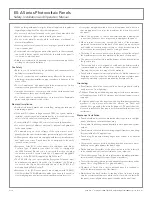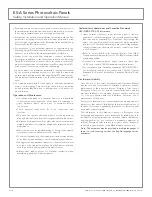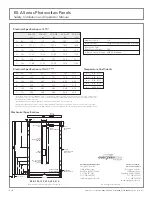
• When working with panels in light, follow all applicable regulation
regarding working with live electrical equipment.
• Do not touch electrical terminals or the ends of any wire while the
panel is exposed to light or while installing the panel.
• Do not wear metallic jewelry while performing mechanical or
electrical installation.
• Never open electrical connections or unplug connectors while the
circuit is under load.
• Contact with electrically active parts of the panels, such as terminals,
can result in burns, sparks and lethal shock whether the panel is
connected or disconnected.
• Always use insulated tools and rubber gloves that are approved for
working on electrical installations.
Fire Safety
• Refer to your local authority for guidelines and requirements for
building or structural fire safety.
• The roof construction and installation may affect the fire safety of
a building; improper installation may contribute to hazards in the
event of fire.
• For roof application, the panels should be mounted over a fire
resistant covering rated for the application.
• It may be necessary to use components such as earth ground fault
circuit breakers, fuses and circuit breakers.
• Do not use panels near equipment or locations where flammable
gases can be generated or can collect.
Electrical Installation
• Avoid all electrical hazards when installing, wiring, operating and
maintaining a panel.
• If the total DC system voltage exceeds 100V, the system must be
installed, commissioned and maintained by a licensed electrician
unless local electrical codes determine otherwise.
• Contact with a DC voltage 30V or more is potentially hazardous.
• Do not use panels of different electrical or physical configurations
in the same system.
• The maximum open circuit voltage of the system must not be
greater than the specified maximum system voltage for the panel.
• All Evergreen Solar panels are equipped with factory-installed wires
and quick connectors. Panels have been designed to be easily
interconnected in series.
• Evergreen Solar ES-A series panels are equipped with Multi-
Contact
®
Type 4 clickable connectors. In order to comply with
the 2008 National Electric code for accessible arrays, the plug
connection must be secured with the UL approved, pluggable
safety lock clip (PV-SSH4) supplied by Multi-Contact
®
.
• The PV-SSH4 clip is not provided by Evergreen Solar and must
be purchased separately. Once the clip is installed, the PV plug
connection can only be unlocked with the use of the PV-MS tool,
also supplied by Multi-Contact
®
.
• Evergreen Solar ES-A series panels are equipped with 10AWG,
UL4703 certified PV-WIRE which enables the panels to be used in
electrically ungrounded systems with transformer-less inverters.
• Use system wiring with suitable cross-sectional areas and connectors
that are approved for use at the maximum short-circuit current of
the panel.
• Match the polarities of cables and terminals when making the
connections; failure to do so may result in damage to the panel.
• When reverse currents can exceed the value of the maximum
protective fuse marked on the back of the panel, a properly rated
and certified over-current device (fuse or circuit breaker) must be
connected in series with each panel or string of panels.
• The rating of the over-current device shall not exceed the value of
the maximum protective fuse marked on the back of the panel.
• The panel contains factory installed bypass diodes located inside
the junction box.
• The junction box is not designed or certified to be field accessible
or maintainable and should under no circumstances be opened.
Opening the junction box may void the warranty.
• Panels with a suspected electrical problem should be returned to
Evergreen Solar for inspection and possible repair or replacement
as per the warranty conditions provided by Evergreen Solar.
Grounding
• Panel frames should be connected to an earth ground for safety
and protection from lightning
• The panel frame is provided with grounding holes that accommodate
self-tapping screws. A #10-32 stainless steel thread cutting screw is
required.
• Evergreen panels can also be grounded using third party grounding
washers or clip devices provided the devices are listed and
identified for grounding the metallic frames of PV panels and the
devices are installed in accordance with the manufacturers specified
instructions.
Mechanical Installation
• Panels should be mounted to maximize direct exposure to sunlight
and to eliminate or minimize shadowing.
• Even partial shadowing can substantially reduce panel and system
output.
• Panels must be securely fastened using support frames or mounting
kits specialized for PV applications.
• Panels may be mounted at any angle from vertical to horizontal
orientation.
• Care must be taken to avoid low tilt angles which may cause dirt to
build-up on the glass against the frame edge.
• Dirt build-up on the surface of the panel can cause active solar cells
to be shaded and electrical performance to be impaired.
• Contact Evergreen Solar for more information regarding minimum
recommended tilt angles for specific panel products.
• For roof mounted systems, provide adequate rear ventilation under
a panel for cooling (100mm: 4 in. gap minimum).
• Clearance of 7mm: ¼ in or more between panels is required to
allow for thermal expansion of the frames.
• Always keep the back surface of the panel free from any foreign
objects or structural elements which could come into contact with
the panel, especially when the panel is under mechanical load.
2 of 4
Valid from 1
st
September 2008 / IM-ES-A_US_010908_ETL © 2008 Evergreen Solar, Inc.
ES-A Series Photovoltaic Panels
Safety, Installation and Operation Manual






















